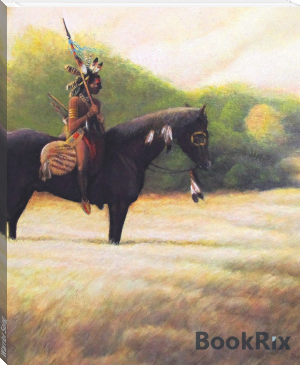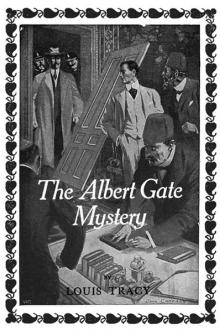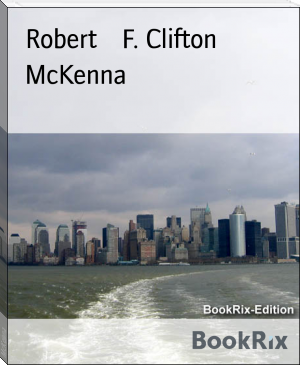Warrior Song - Robert F. Clifton (electronic book reader txt) 📗

- Author: Robert F. Clifton
Book online «Warrior Song - Robert F. Clifton (electronic book reader txt) 📗». Author Robert F. Clifton
“Then what will you do husband?”
“Work, earn wages, save. The white man has taught me the importance of money. With it you can do most anything. Without it you are destined to walk the earth constantly without.
When I have enough of the gold coins I will decide if we will stay here with our people or go to the big city I once visited”.
“You have told me of the big city. From what you have told me I am afraid to go there. You say there is much noise and people, people who do not like us”.
“You can get use to it and then live as a white person among them”.
“You say yourself that the white man changed you at the Indian School. I went to school here with my own people. Here they did not make me wear leather shoes. I spoke the language of our people, but learned the words of English. I know what a train is, but I never saw or heard of one that goes under the ground. I can not imagine a house so tall that the top of it is in the clouds. The cabin you built for us and our son is not right next to another. Yet you have told me tales of how many people live in one house in things called apartments and there are many voices and many smells. For these reasons I am afraid husband”.
“There is nothing to fear. We will be safe if I decide to go there.”
“You were restless in your sleep last night.”
“I'm sorry if I disturbed you. The bad dream came again”.
“The dream of the pony soldier with the red hair?”
“Yes. I saw him, but this time he came to me with no eyes and a wide smile on his lips”.
“Perhaps he comes to you from Seana, The Camp of the Dead”.
“I have killed him many times in my mind and dreams.”
“And still he haunts you”.
*****************
In his room at Fort Myer Lieutenant McKenzie looked at the signature of Adam Henderson signed at the bottom of the letters written and sent to Army Headquarters in Washington, D.C. Relying on memory he mentally compared what he was looking at to what he had seen on the registry of the Waldorf-Astoria. To him, they were similar, but at the same time he needed them to be exact. Only an expert handwriting analyst could make the determination needed to see if Henderson signed the registry or that it was a forgery. One thing was certain. Henderson did have a beaded tobacco bag and he admitted that it had been made by a Sioux woman. He reached for the tablet with white pages and with pen and ink wrote: Henderson has beaded tobacco pouch. Pouch in disrepair, several beads missing. Next, make arrangements to seek and find, Charles Lean Bear.
“So, I take it that you're basing your case on the red glass bead that was found in Parker's hotel room”, said Colonel Willett.
“No sir, but I will say that at this time it is an important piece of evidence. I state in my reports that Henderson has a pouch that the bead very well could have dropped from while he was in the room”.
“Alan, I will be the first to admit that I have spent some time on the western plains. Nonetheless, I do know that there are probably thousands of beaded pouches right now on any of the reservations where the tribes now live. At the same time you yourself report that during the month of April there were about fifty to a hundred Sioux in Brooklyn. Yet, you seem to want to dwell on Adam Henderson”.
“An Adam Henderson or some one pretending to be him signed into the Waldorf-Astoria. He had a motive to want to kill Parker and we now know that he has an Indian made, beaded pouch, a pouch where at one time one particular red, glass bead was attached.
“Speculative and circumstantial. You have nothing positive, do you?”
“No sir”.
“Alright then, go back to New York. Meet with your Detective Sergeant friend. I want to know what the police are up to and if they are making any progress in the case”.
“I was planning on making arrangements to go to Oklahoma. I want to meet and talk with Charles Leaning Bear”.
“All in good time. New York is your destination and also your orders”.
“Yes sir”.
As Alan McKenzie hung a suit in the bedroom closet Mrs. Brentwood stood just outside of the bedroom door. “It's none of my business of course, Mr. McKenzie, but one of these times when you return I might not have a room for you to rent”.
McKenzie looked at her and smiled. “And, no one knows that better than I. Still, it's a chance I must take”.
“You could rent it for a year”, said the landlady.
“I'm afraid my company won't pay the expense not knowing if and when I'd be in town”.
“I see. Well, don't say I didn't warn you”.
“Yes Mam. Thank you”.
Mid-morning of the next day McKenzie sat beside the desk of Sergeant Patrick O'Malley. “So, how was your trip and what do you have to say to me this fine morning?”asked O'Malley.
The trip was hot and dry. I did meet with Adam Henderson. He denied not only never having been in the Waldorf-Astoria, but New York City as well”.
“And tell me now, do you believe him?”
“I don't know what to believe. He wasn't too upset or concerned about Parker's death. He displayed more interest in the well being of one of his past sergeants.”
“Really now?”
“I did accomplish one thing”.
“And, what would that be?”
“Henderson has a beaded tobacco pouch and he stated that a Sioux woman made it for him. He gave her a cup of sugar in return.”
“And tell me, was it missing the bead that you told me about?”
“It is missing several beads”.
“Truly?”
“Yes, I even held it and examined it myself”.
“Ah, Alan, the Saints themselves might be looking down on us”.
“That may be. However, I did tell him that you are working the case and that you might go there to talk to him”.
“I'll not be taking a long, hot train ride. What I will do is contact the Dallas Police and have them take several photographs of your Mr. Henderson. Once I have them I will show it to the desk clerks at the hotel. It will be them that either identifies him or say no”.
“I see. I did have one other thought”, said McKenzie.
“And what would that be?”
“The pouch, as I said was missing several beads. I'm wondering if perhaps, just perhaps more than one bead dropped from the pouch and could possibly be under the bed in the room”.
“It's possible. We can question the maid again. First let me get my request off to the Dallas people”.
*****************
Elsie McCarthy sat nervously twisting a dust cloth in her hands. Looking At Sergeant O'Malley she said, “I've told you all I know about that morning sir.”
“I'm sure you have, but you see my fine girl, things come up, things that we police want to have answers. What I want to know is that other than the red, glass bead you found when sweeping the rug did you find any others, say under the bed?”
“Now sir. As I told you, the men removed the blood soaked mattress. It was then that I looked down through the bed springs.”
“What were you looking for?”
“Dust mites and any blood that might have gathered”.
“Then you didn't see any other beads under the bed or anywhere else in the room?”
“No sir”.
“Can you think of anything else? Anything strange or unusual?”, asked McKenzie.
“No sir, other than the damage I reported to the Housekeeper.”
“What kind of damage?”, asked O'Malley.
“When I went to empty the ashtray I noticed that is was chipped. Being glass someone, say the next guests could cut themselves on it.”
“Are you sure that it wasn't damaged before?,” asked McKenzie.
“I'm, positive. I empty the ashtrays every morning if they’ve been used. Mr. Parker used the two in his room frequently filling them with old smelly cigars and cigar ashes”.
“So it was when you were emptying cigar ashes that you notice the chip in the ashtray?”, asked O'Malley.
“Yes sir”.
“A normal duty is it not?”
“Yes sir., but this time the ashtray had burnt tobacco, like when someone would smoke a pipe then discard the ash by tapping the pipe on and into the ashtray. It wasn't cigar ash, Mr. Parker s cigar ashes were white. The tobacco I'm mentioning was dark, almost black”.
“Could be a blend using molasses”, said O'Malley turning to McKenzie.
McKenzie looked at O'Malley and said, “We have a cigar in Parker s belongings, but no sign of a pipe or pouch belonging to him”.
“Aye, then that just leaves your Henderson fellow and several million pipe smokers in the nation as suspects,” answered O'Malley.
*****************
Colonel Willett sat at his desk reading the morning New York Journal. He read about how the Cuban people were being mistreated in their own island nation. According to the newspaper, women and children were being starved to death.
Concentration camps had been constructed and thousands of Cubans were incarcerated and mistreated. Both the New York Journal and the New York World printed stories nearly everyday about Spanish troops committing atrocities. American business men with investments in Cuba grew concern about losing property and capital. At the same time there were those that supported President McKinley ideas for expansion. Some wanted the United States to annex the island only ninety miles off the tip of Florida. To Willett it seemed that the United States and Spain were having their relationship deteriorating. It seemed that every week the Americans, either politicians or journalist's accused the Spanish of the abuse of human rights. Others demanded that Spain grant the Cuban's their independence.
The Cuban situation was also on the minds of the men seated for dinner at Mrs. Brentwood's Boarding House. “I say send in the navy and marines and throw the Spanish out. Then, and only then will the Cuban people be allowed to form their own democratic government. Don't you agree Mr. McKenzie?”, asked Mr. Finley.
“I'm sorry. I don't get involved in politics, domestic or international”, McKenzie replied.
“All of us, one way or another will be involved if there is a war, whether we want to or not”, said Harvey Perkins.
“Hear, Hear”, said Finley in agreement.
“Well, I for one hope that there is never a war”, said Miss Bell.
“As you are a woman I would suggest that you take the attitude of Mr. McKenzie. Don't get involved in politics”, said Finley.
“As a woman I certainly have the right sir to oppose war, particularly when it involves my country,” Edna Bell replied.
“Next, women like you will want the vote”, said Perkins.
“We should have that right now”, Edna responded.
“Mr. McKenzie, surely you would serve your country if there was indeed a war?”, asked Finley.
“Of course. However, in my mind I'd be fighting not for the liberation of the Cuban people, but for the capitalist's and expansionists who at the present time are slowly pushing us into a war”.
“Are you against expansionism?”, asked Finley.
“Why is it necessary?”, asked McKenzie
“I'm sure that you have heard of the “Manifest Destiny”, sir”, said Finley.
“Yes, which one? Thomas Jefferson's or William McKinley's?”, asked McKenzie.
“Both. The first, Jefferson’s results expanded this nation coast to coast. The next one will result in the United States becoming a world power”.
“Perhaps you can tell me why that is so important”, said McKenzie.
“It is important that our nation take its place in the world,”
“No, no my friend. The desire for expansion is for the extending of present and future trade agreements





Comments (0)